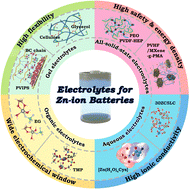Advances and strategies of electrolyte regulation in Zn-ion batteries
Abstract
Zinc-ion batteries (ZIBs) have been attracting much interest as metallic Zn anodes have high theoretical capacity and low redox potential. However, the practical use of ZIBs is severely hampered by issues related to zinc dendrites, corrosion, passivation, by-products, cathode dissolution, and harmful electrostatic interactions. The electrolyte, which comes in contact with the cathode and anode simultaneously in batteries, is a crucial component directly related to these problems. In recent years, many investigations have been conducted on electrolyte optimization. The effects of electrolyte optimization on the cathode and anode, including the effect on the charge storage mechanism and the improvement of reaction kinetics, are still not clear completely. Therefore, more attention must be paid to the electrolytes in ZIBs, which is not only conducive to ensure the stable operation of the electrolyte itself, but also further increases the electrochemical efficiency of cathodes and anodes, so as to cooperatively enhance the electrochemical performance of ZIBs, endowing ZIBs with long life and high stability. In this review, the progress in different electrolytes including aqueous electrolytes, organic electrolytes, gel electrolytes and all-solid-state electrolytes is summarized for ZIBs. Also, the effect of different electrolytes on the electrodes and charge storage mechanism is discussed. Finally, the difficulties and prospects of the electrolytes for ZIBs are examined with potential research areas in mind for ZIB development in the future.

- This article is part of the themed collection: 2023 Materials Chemistry Frontiers Review-type Articles


 Please wait while we load your content...
Please wait while we load your content...